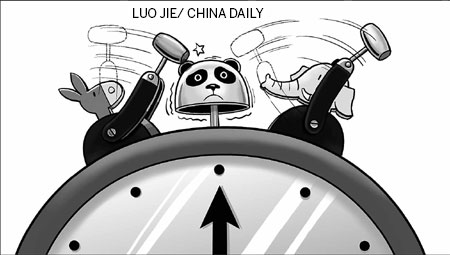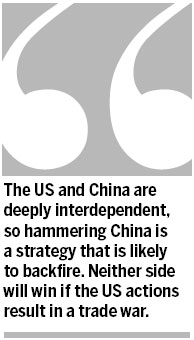

"Hammering China" has become increasingly popular on the other side of the Pacific in the run up to the presidential election. In the latest instance, the World Trade Organization said on Thursday that the United States had filed a complaint against China for imposing duties on some US-made automobiles.
Ron Kirk, the US trade representative, said in a statement that "the (Barack) Obama administration will continue to fight to ensure that China does not misuse its trade laws and violate its international trade commitments to block exports of American-made products".
On Dec 14 last year, the Chinese government decided to impose anti-dumping and anti-subsidy duties on sedans and sports utility vehicles with engines of 2.5 liters and above imported from the US after an investigation showed evidence of dumping. This was widely interpreted by US media outlets as retaliation for the US imposing tariffs on imports of Chinese tires. They failed to mention that the Obama administration subsidized US automakers General Motors and Chrysler in 2009.
The Obama administration gave General Motors a $49.5 billion bailout and provided Chrysler with $12.5 billion in bailout funds.
In fact, the republican candidate Mitt Romney opposed a government bailout of the troubled automakers. In an article in the New York Times in 2008, he argued that it would be good for the auto industry if Detroit automakers were denied government assistance and allowed to go bankrupt.
It should be noted that the complaint to the WTO has been filed half a year after China imposed the duties on imports of US-made automobiles. This is because the Obama administration wants to hammer China to win the support of the manufacturing states in the presidential election, and because his opponent Romney is attacking Obama by claiming he is too soft on China. Thanks to the blame game played by the US media, many, if not most, of the voters in these states now consider China the main reason the US economy has hit the rocks.
However, the truth is, the US has already shifted much of its automobile manufacturing to countries such as Canada, Mexico, even China. Dan Akerson, the CEO of General Motors, admitted in February 2011 that 70 percent of the company's cars are manufactured outside the US.
As the presidential election approaches, the competition to see who can be tougher with China is becoming more intense. In trade alone, the US has already raised a series of lawsuits against China encompassing products ranging from rare earth materials to steel and chicken.
The US participated in the rule-making process of the WTO, so it knows how to use the rules to its advantage.
"Many WTO members are concerned with how the United States implements WTO rules in the respect of trade remedy issues," Li Chenggang, head of the Ministry of Commerce's department of treaty and law, said after the ministry announced on Sunday it will begin formal consultations with the US on the countervailing measures imposed by the US against Chinese exports. The consultations will take place on July 18 and 19.
A consultation request was filed by China with the Dispute Settlement Body of the WTO on May 25. According to the ministry, 22 product categories, including steel, solar cells and paper, are involved.
Regarding the US complaint about China's duties on cars imported from the US, the ministry said it will handle the request in accordance with the dispute settlement procedures of the WTO.
Actual competition between the two countries might have partly prompted the US government to instigate this action, but the upcoming election and Obama's promise to revive the US' manufacturing industry are the main causes.
The US and China are deeply interdependent, so hammering China is a strategy that is likely to backfire. Neither side will win if the US actions result in a trade war. The US needs to realize the price of hammering China, so as to avoid losses for all.
The author is a senior editor with the Study Times.
(China Daily 07/11/2012 page9)